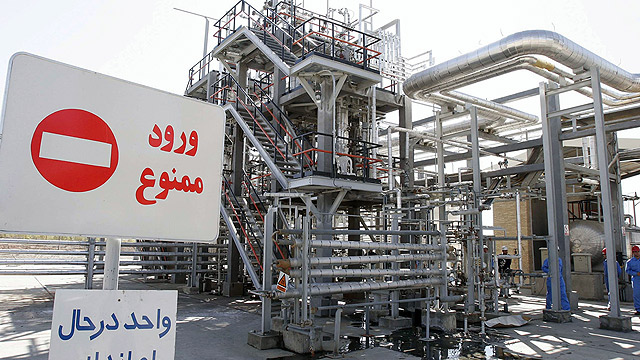Russia-Egypt ties on the rise
Maria Dubovikova/Al Arabiya/August 27/15
Russian-Egyptian ties have improved markedly since Abdel Fattah el-Sisi became president. His recent visit to Russia was the third since he was elected, and the second in one year. It was the third meeting between the two presidents in 2015, as Vladimir Putin was warmly welcomed in Cairo in February. Bilateral trade has skyrocketed, with both sides expressing their will to increase it further. Cooperation is rising in all fields, but military cooperation has been the most remarkable. In addition to previously signed contracts worth of billions dollars, another was signed days before Sisi’s arrival that was worth $2 billion and concerned delivery of 46 MiG-29 fighter jets to Egypt.
Putin and Sisi have called for a broader coalition to combat terrorism
The countries are set to develop energy ties. Russia is to build two nuclear reactors in Egypt to help fulfil the latter’s energy needs. During his visit, Sisi also discussed agricultural, educational and parliamentary cooperation. The speaker of Russia’s State Duma, Serguei Naryshkin, said Moscow was ready to send observers to Egypt’s forthcoming parliamentary elections, adding that bilateral cooperation was in the hands of their respective lawmakers.
Global implications
However, the key issue that was discussed, and which has global implications, was the fight against terrorism. Putin discussed the same topic with Jordan’s King Abdullah II and Abu Dhabi’s Crown Prince Mohammad bin Zayed al-Nahyan. Meetings between the three Arab leaders also took place in Moscow, and they discussed common challenges and problems they face due to the spread of the Islamic State of Iraq and Syria (ISIS). Putin and Sisi have called for a broader coalition to combat terrorism. Jordan’s king said Russia was a crucial player in the Middle East, and had a “vital role” to play in finding a political solution to the Syrian conflict – a position shared by Sisi. These Middle Eastern countries are likely seeking a comfortable balance between the West and Russia, as both are needed to settle regional problems. They are also seeking more freedom of choice and independence in their decision-making. They want to listen to both sides and decide which vision is best for them. Sisi’s support for a broader coalition against ISIS could persuade other players to consider the idea. However, the inclusion of the Syrian government remains a stumbling block for most countries fighting ISIS as part of the U.S-led coalition. Russia knows that the key to its growing influence in the Middle East lies in its warmer relations with Egypt, which remains a major regional player.
Report: Russia-Iran disagreement holding up S-300 deal
ARIEL BEN SOLOMON/J.Post/08/27/2015 /Negotiations for Russia to supply Iran with the advanced S-300 surface-to-air missile system hit a snag over Russia’s demand that Iran end its lawsuit for failure to deliver the system under a previous contract. The talks over a new contract are ongoing, but the two countries are still unable to agree on how to proceed regarding Iran’s lawsuit, a source in the Russian military-technical cooperation establishment told the state-run TASS news agency in a report published on Wednesday evening. “Consultations are in progress. A final agreement has not been reached yet. Iran says it will revoke the lawsuit regarding the previous contract when it gets the first batch of products under the new one, while Russia insists the lawsuit should be revoked before it takes any action under the newly-concluded deal,” the source said.
The source said, according to the report, that Russia was firm in its decision to supply Iran with the air defense system, adding that a compromise could be reached where delivery and cancellation of the lawsuit could occur simultaneously. Vyacheslav Davidenko, spokesman for Russia’s state-owned arms export monopoly Rosoboronexport, declined to comment. Russia and its state media have made numerous statements regarding the sale or delay of the delivery of the S-300 system over the years. The often contradicting reports appear to be a propaganda operation that changes according to the country’s political interests. “It is a game two can play. From time to time Iranians are those who make declarations on the S-300. I guess to pressure the Russians and the US,” Yuri Teper, a Russian expert from Ariel University, told The Jerusalem Post on Thursday. Russians are known for making a lot of fuss about very little or unfinished deals, as happened with their energy deal with the Chinese,” Teper said on Wednesday. Iran said it would sign a contract with Russia this month to buy four S-300 surface-to-air missile systems, the Iranian defense minister said. Russian state arms producer Almaz-Antey in June said it would supply Iran with a modernized version of the S-300, among the world’s most capable air defense systems, once a commercial agreement was reached. In 2010, under Western pressure, Russia suspended a 2007 agreement to sell five S-300 batteries to Iran under a contract then reported to be worth some $800 million. Reuters contributed to this report.
UN nuclear watchdog: Iran building extension at disputed military site
REUTERS/J.Post/08/27/2015/VIENNA – Iran appears to have built an extension to part of its Parchin military site since May, the UN nuclear watchdog said in a report on Thursday delving into a major part of its inquiry into possible military dimensions to Tehran’s past atomic activity. A resolution of the International Atomic Energy Agency’s Parchin file, which includes a demand for IAEA access to the site, is a symbolically important issue that could help make or break Tehran’s July 14 nuclear deal with six world powers.
The confidential IAEA report, obtained by Reuters, said: “Since (our) previous report (in May), at a particular location at the Parchin site, the agency has continued to observe, through satellite imagery, the presence of vehicles, equipment, and probable construction materials. In addition, a small extension to an existing building appears to have [been] constructed.” Diplomats say any activities Iran has undertaken at Parchin since 2012 are likely to have undermined the agency’s ability to verify intelligence suggesting Tehran previously conducted tests there relevant to nuclear bomb detonations.Under a “roadmap” accord Iran reached with the IAEA parallel to its groundbreaking deal with the global powers, the Islamic Republic is required to give the Vienna-based watchdog enough information about its past nuclear activity to allow to write a report on the long-vexed issue by year end. “Full and timely implementation of the relevant parts of the road-map is essential to clarify issues relating to this location at Parchin,” the new IAEA report said. Iran has for years been stonewalling the PMD investigation but delivered on a promise under the roadmap to provide more information by August 15. IAEA Director-General Yukiya Amano said on Tuesday that the agency had received substantive amounts of information from Iran although it was too early to say whether any of it is new.




















